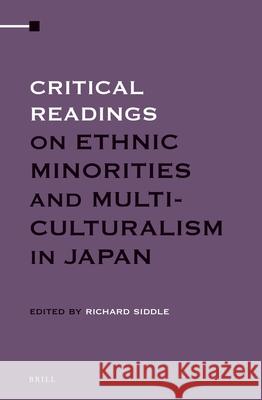Critical Readings on Ethnic Minorities and Multiculturalism in Japan (3 vol. set) » książka
Critical Readings on Ethnic Minorities and Multiculturalism in Japan (3 vol. set)
ISBN-13: 9789004235199 / Angielski / Twarda / 2013
A collection of the best scholarship on the subject of minorities and multiculturalism in Japan, with a special focus on recent work dealing with Japan's ongoing transition to a country of immigration and the social and political responses to this. Multiculturalism (itself defined and practiced in different ways), and the supposed backlash against it, is currently one of the most important social and political issues in the developed world in the contexts of immigration, social cohesion and security. Japan, facing a declining population and increased immigration, is beginning to address these issues at a time when the discourse around them has become highly charged in the West. On the other hand, Japan also faces specific problems rooted in the geopolitical context of East Asia (the two largest minorities in Japan are Chinese and Korean) and its own imperial past. While seminal articles on Japan's older established ethnic minorities will be included, the framework will move from class and 'race' based analyses of majority/minority conflict to more recent essays that address emerging concepts of a multicultural and hybrid Japan. These will be drawn from the disciplines of sociology, anthropology and history. The whole collection will be framed by a critical introduction specially written for the project that places Japan within the wider context of ongoing global debates over multiculturalism, and highlights the economic, social and political relevance of ethnic minorities in a changing 21st century Japan. The introduction will also trace the genealogy of scholarship on ethnic minorities in Japan, and offer explanations and critiques of the readings themselves.











